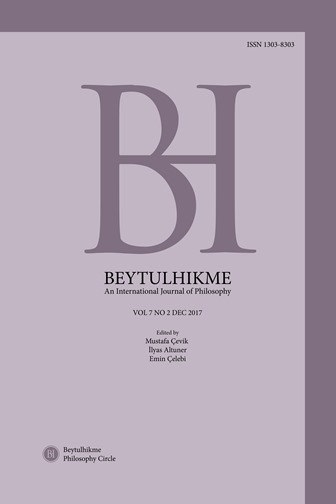Author :
Abstract
Adalet kavramı her zaman filozofların, sosyal bilimcilerin ve siyaset yazarlarının zihnini meşgul eden önemli problemlerden biri olmuştur. Şimdiye kadar yapılan çalışmaların çoğu, bu temel kavramın, sosyal, ekonomik ve politik açılımları kadar anlamı ve tanımı üzerine yoğunlaşmış gözükmektedir. Kindî, Fârâbî, İbn Sinâ, Ebû Miskeveyh ve Nasirüddin Tûsî gibi Müslüman filozoflar, yazılarının önemli bir kısmını adalet konusuna ayırıp, onu bir bakıma özellikle Eflatun ve Aristo gibi Antik Yunan filozofları ele alıp incelemişlerdir. Onlar gibi, genelde tabii (doğal), ebedi ve sabit-değişmez, ahlâken de en kapsamlı bir erdem olarak algılanan rasyonel bir adalet kavramı geliştirmişlerdir. Gazâlî, İbn Arabî ve Mevlânâ gibi mutasavvıf-filozoflar ise, adaleti başlangıçta, tıpkı yukarıda zikredilen filozoflara benzer bir şekilde kabul edip, Tanrı’nın âleme ebedî olarak yerleştirdiği, metafiziksel hikmet bağlamı içinde yorumlayıp açıklamışlardır. Daha sonra, Kur’an’ın ilgili ayetleri ve Hz. Peygamber’in sözlerine getirdikleri yorumlar üzerine, kendi adalet kavramını geliştirmişlerdir.
Keywords
Abstract
The concept of justice has always been one of the central issues that have occupied the minds of many philosophers, social scientists and political writers from the ancient to the modern times. So far most of the studies appear to have focused on the meaning and definition of this pivotal concept, as well as its social, economic and political implications. Several prominent Muslim philosophers in the past, such as al-Kindi, al-Farabi, Ibn Sina, Ibn Rushd, Abu Miskawayh, and Nasır al Din Tusi, devoted a significant segment of their political and ethical writings to the subject-matter of justice, which they treated and examined more or less in a similar fashion as the ancient Greek philosophers, especially Plato and Aristotle, had done. Like them, they developed a rational conception of justice, which is generally viewed as natural, eternal, and immutable and ethically as the most comprehensive virtue. Muslim theosophers or Sufi philosophers, such as al Ghazali, Ibn al-‘Arabi and Mawlana Rumi, have initially conceived justice in the same form as the philosophers just-mentioned above and, as will be seen in this study, elaborated it further mainly within the context of metaphysical wisdom that is eternally implanted by God in the universe. Then later, on the basis of their own interpretations of the relevant verses of the Qur’an and the Prophetic sayings, they developed their conception of justice.
Keywords
- Al-Farabi (1961). Fusul al-Madani: Aphorisms of the Statesman (ed. and trans. D. M. Dunlop). Cambridge: University of Cambridge Press.
- Al-Farabi (1972). The Attainment of Happiness (trans. M. Mahdi). Medieval Politi- cal Philosophy: A Sourcebook (eds. R. Lerner and M. Mahdi). Ithaca: Cornell University Press.
- Al-Farabi (1972). The Political Regime (Al-Siyasat al-Madaniyya). Medieval Politi-
- Al-Ghazali (1992).. The Ninety-Nine Names Beautiful Names of God (a-Maqsad al-Asna fi Sharh asma Allah al-Husna) (trans. D. B. Burrell and N. Daher). Cambridge: The Islamic Texts Society.
- Al-Tusi, N. (1964). The Nasirean Ethics (trans. G. M. Wickens). London: George Allen & Unwin.
- Avicenna (1972). Healing: Metaphysics X: Avicenna on the Proof of Prophecies and the Interpretation of the Prophets’ Symbols and Metaphors (trans. M. E. Marmura). Medieval Political Philosophy: A Sourcebook (eds. R. Lerner and M. Mahdi). Ithaca: Cornell University Press.
- Baruddin, B. (1991).. Abu ‘Ala Miskawayh: A Study of His Historical and Social Tho- ught. New Delhi: Islamic Book Foundation.
- Can, Ş. (2005). Hz. Mevlânâ’nın Rubâileri. 2 vols. Konya: İl Kültür ve Turizm Mü- dürlüğü.
- Chittick, W. C. (1983). The Sufi Path of Love: The Spiritual Teachings of Rumi. Al- bany: SUNY Press.
- Chittick, W. C. (1989). The Sufi Path of Knowledge. Albany: SUNY Press.
- Ibn al-‘Arabi (1946). Fusus al-Hikam (ed. A. Afifi). Beirut: Dar al-Kutub al-‘Arabi.
- Ibn al-‘Arabi (1980). The Bezels of Wisdom (trans. R. W. J. Austin). New York: Paulist Press.
- Miskawayh (1964). An Unpublished Treatise of Miskawayh on Justice or Risala fi Ma- hiyat al-‘Adl li Miskawayh (ed. and trans. S. M. Khan). Leiden: E. J. Brill.
- Nicholson, R. A. (1982). The Mathnawi of Jalalu’ddin Rumi. 6 vols. Commentary. 2 vols. Cambridge: The E.J. W. Gibb Memorial.
- Nicholson, R. A. (1998). Rumi: Poet and Mystic. Oxford: Oneworld.
- Rumi, M. J. (1977). Discourses of Rumi (Fihi mi Fih) (trans. A. J. Arberry). New York: Samuel Weiser.
- [*] Makalenin orjinali için bakınız. Bilal Kuşpınar (2016). An Analysis of the Views of al-





